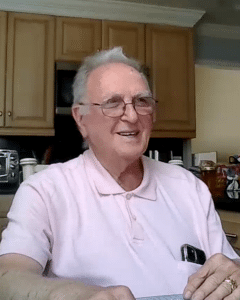- Stories & Testimonials
- YouthFirst
For the past fourteen summers, the JFCS YouthFirst Summer Internship Program (now known as the Shmunis Internship Program) has connected hundreds of high school students with Bay Area businesses, offering them meaningful opportunities to explore career paths aligned with their interests.
This summer, one of those students joined the JFCS Marketing and Development team with a passion for storytelling. Her project: to interview a Holocaust survivor and transform their testimony into both a written blog and a short video—an unforgettable experience in honoring memory through narrative.
We’re deeply grateful for the dedication Poppy brought to her time with JFCS. A heartfelt thank you to her and to all of the interns who contributed their talents this summer. We’re also immensely appreciative of our partner businesses for generously offering their guidance and expertise throughout the season.
Recently, through the JFCS YouthFirst Summer Internship Program, I was offered the incredible opportunity to meet Ivan Streger. Ivan is an active member in Cafe by the Bay, a JFCS program for Holocaust survivors to meet each week. From the moment he welcomed us into his home with warmth and enthusiasm, I could sense that his story would be something truly special.
—Poppy Gwozdz , Convent High School, JFCS Marketing & Development Department Summer Intern
Life as a Hidden Child
Ivan was born in 1943 in Debrecen, Hungary. When the Nazis began deporting Hungarian Jews in 1944, Ivan’s father, fearing the worst, asked a non-Jewish friend to protect his wife and newborn son if anything happened to him.
That friend kept his promise. After Ivan’s father was taken to a concentration camp, the man hid Ivan, his mother, and six other Jewish women and their children in a cave. Though he has no memory of that period, Ivan was told that he cried constantly from hunger.
In 1946, Ivan’s father returned home after surviving the concentration camps by cooking for the Nazis. Determined to escape the dangers still looming in postwar Hungary, Ivan’s grandmother bribed border guards to secure a narrow window for Ivan and his mother to flee. With only six minutes to cross into Austria before the guards opened fire, they ran for their lives, only narrowly dodging the bullets.

Holocaust survivor Ivan Streger shares his testimony.
The Long Journey
In Austria, exhausted and uncertain, they met a stranger at a train station who took them in, hiding them in her home for three days before helping them reach a nearby Jewish relief agency. From there, they traveled by train to Naples, Italy, and found temporary refuge at a seaport camp near Mount Vesuvius, which was active at the time. Ivan vividly remembers the constant tremors and ash in the air.
Eventually, they were smuggled aboard a livestock ship headed for Israel on a refugee extraction mission coordinated by the Haganah, the underground Jewish paramilitary group. Because British immigration restrictions prevented the ship from docking, passengers were dropped into the sea just offshore from Haifa. Ivan and his parents plunged into the water, where members of the Haganah were waiting to pull them to safety.
Coming of Age
Once they reached land, a driver secretly transported them to Tel Aviv. Life in Israel brought its own challenges. Ivan’s parents eventually divorced, and rather than split time between two homes, he chose to live on a kibbutz—a communal settlement where children were raised collectively. There, he became a shepherd and found peace in solitude and nature.
His independence shaped his path. As a teen, he finished high school, served in the Israeli army, and studied mechanical engineering. Later, he taught wilderness survival to other young Israelis, passing on his skills and resilience.
A Survivor’s Outlook
Ivan’s outlook stood apart from other survivor testimonies I’ve heard. As harrowing as his story was, he conveyed it with humor, lightness, and strength. His story was defined by an unwavering adaptability. He embraced the unfamiliar, learned from it, and kept moving forward. When I asked him what advice he’d give young people, he said:
“First of all, respect your mother and father. Secondly, study hard, because knowledge is one thing in life no one can take away from you. Lastly, be kind. Follow the Golden Rule. And in life, to be good or to be bad takes the same amount of energy, so you might as well be good.”

JFCS YouthFirst Intern Poppy interviews Ivan, a Holocaust survivor, in his home.
My Takeaway
I’m incredibly grateful to have had the opportunity to listen to Ivan’s story. Although he was just a child during the war, his optimism, fearlessness, and compassion shaped the life he built and left a lasting impression on me.
As young adults today, it’s essential that we listen to survivors like Ivan. Their stories forge intergenerational connections, help us understand the past in a way that school textbooks cannot, and they ensure that memory, empathy, and shared responsibility are passed on to future generations.
|
JFCS’ YouthFirst Department helps teens develop the necessary life skills to move into young adulthood smoothly, successfully, and responsibly through a Jewish values-based lens. Our programs include Jewish service-learning, leadership skills development, peer mental health training, internships, career exploration, and more. The growth of SIP has been made possible by the leadership and generosity of Vlad and Sana Shmunis, who have established the Shmunis Youth Endowment Fund to strengthen and expand opportunities for local teens. To learn more about JFCS YouthFirst internships and other learning opportunities for teens, visit our website.
|
